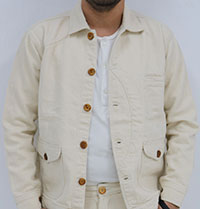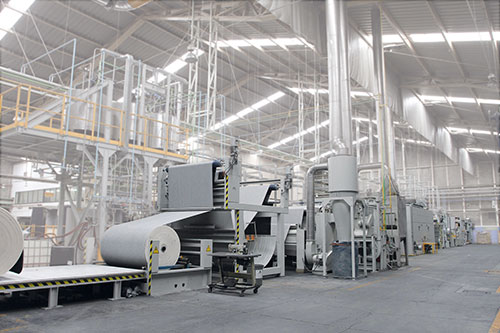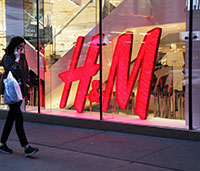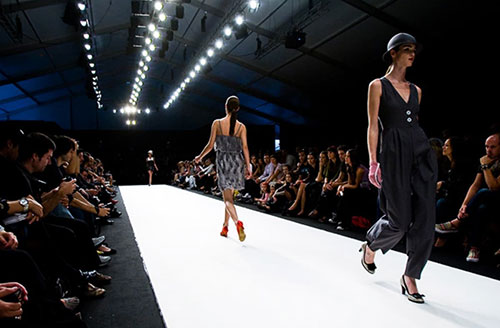FW
Brands in France want to improve their textile traceability. Transparency has gained traction, becoming a primary concern for brands that had previously emphasized sustainable or recycled materials and the disuse of harmful fur and leather. Accountability has come into apparel sourcing, which includes concerns for textile supply. Brands have identified social and environmental priorities. Beyond textiles, brands have struggled with the human aspect, casting child labor, forced labor and workplace safety.
Brands are primarily interested in the use of chemical products, harmful to human beings and the environment alike. This criterion has a strong lead, with much more sway compared to water consumption, transportation optimization for goods or the question of greenhouse gas emissions. Chemical use is of main interest, since it could protect consumers from the direct effects of carcinogenic products, for example.
Retailers now want to do away with the bulimic nature of supply, which nevertheless prevails on orders. Brands no longer want to take risks and now only order what they are near-certain to sell. They are more cautious, measured and less committed at the start of the season. For 2020, about 35 per cent of brands want to reinforce their short-term sourcing, compared to the 65 per cent who wish to maintain their share of orders.
The Garment Manufacturer’s Association in Cambodia plans to suspend operations in some factories due to the outbreak of Coronavirus. Reports suggest around 42,000 Coronavirus cases have been confirmed globally, including 40,235 in China. Of these, 1,000 people have died since the outbreak was first detected in Wuhan city in China’s Hubei province in December.
Wuhan is in lockdown and other parts of China have been affected by the virus as Chinese authorities continue in their efforts to prevent the virus from spreading. Many suppliers have temporarily halted production in the country as Over 60 percent of raw materials used in garment and textile factories in the Kingdom are imported from China. These suppliers will not be able to provide raw materials to factories in Cambodia till the end of February or March.
The European Commission is currently reviewing the Kingdom’s EBA preferential trade status due to perceived setbacks to human rights and democracy following the dissolution of the CNRP and the arrest of its former leader Kem Sokha over a treason charge in 2017. The European Parliament, the Commission has to decide by February 2020 whether or not to suspend Cambodia’s EBA privileges fully or in part. Whatever the outcome, suspension would finally come into effect six months later, by August 2020.
A new show for digital textile printing applications will debut at Drupa, Germany, from June 16 to 26, 2020. This is a new special show for digital textile printing applications. The textile industry is opening up cross-sectional technologies for numerous sectors — Touchpoint textile will bring these companies together, offering space for cross-sector cooperation, new projects as well as product and manufacturing ideas that will be vividly realized in a micro factory on site. The micro factory will demonstrate how digital textile printing, cutting and color management can be integrated in a fully connected production environment. A variety of products, such as flags, T-shirts and bags, will be fabricated hot off the press each day. The special show also represents the increasing establishment of Drupa in new markets, which, in addition to textile printing, includes packaging, large format printing, industrial and functional printing.
Drupa is the world’s leading trade fair for printing technologies. Digital textile printing will also be an important part of the exhibitors' range of products and services beyond the Touchpoint textile special show. Drupa visitors are thus guaranteed a 360-degree view of current developments and trends in textile printing.
Digital textile printing has emerged as a driving force of innovation and growth for new business areas within the print industry.
Union Street, based in Ireland, will open a yarn spinning factory in India. The target is to spin half of its yarn requirements by April 2020, thereby reducing the company’s exposure to Chinese yarn manufacturers, who increased prices substantially in the early part of 2018. The group's production capacity at its spinning factory will be increased in order to produce all of its yarn requirements by the end of the financial year April 2021. Union Street, which sells more than 90 per cent of its wares outside either the UK or Europe to major worldwide conglomerates, saw its profit after tax almost halve. But over the year its staff numbers increased from 653 to 683, most of them operating at factories in India.
The company, founded in the halcyon days of the linen trade in the north, is primarily now involved in weaving, dyeing and finishing of linen and linen cotton fabrics, for sale to the clothing sector. Sales rose by 19 per cent in the year to last April.
Union Street is privately company owned and has demonstrated sustained year-on-year organic growth, profit and financial stability. The company has a policy of continual product development, investing an average of 35 per cent of revenues back into R&D to ensure that the product portfolio is always at the leading edge of technological innovation.
Mongolian cashmere herders are using blockchain technology developed by Convergence. Cashmere is naturally scarce, and its quality and quantity are limited by climate and geography. Herders face income instability and uncertainty and are often indebted to intermediaries for cash advances. There’s a lack of agreement on sustainability and chain of custody processes. Grazing lands are rapidly degrading, threatening the viability of the entire industry.
The process connects buyers interested in sustainability with sellers who follow sustainable practices. The traceability of cashmere is transparent from the herder, all the way through to the end consumer as a result of utilizing blockchain technology. The project has been an enormous success with significant quantities of cashmere getting tracked across three provinces in north-eastern Mongolia, from origin, shearing at herder households, to destination, a processing facility in Ulaanbaatar. Leveraging blockchain technology within the transformation of the cashmere industry can provide numerous benefits for Mongolian herders, buyers, and sellers alike and allow farmers to track their cashmere. Along with this, bales and packing slips get high-frequency RFID tags attached to them. This technology helps mitigate risks by eradicating the traditional manual processes that were time-consuming and prone to human error.
Based in Canada, Convergence provides comprehensive advisory and product development services, with a primary focus on blockchain technology. It operates globally with active projects in 14 different cities worldwide.
 The upcoming Milan Fashion Week will feature a presentation of Reloved, sustainable denim collection developed by haikure in partnership with ISKO.
The upcoming Milan Fashion Week will feature a presentation of Reloved, sustainable denim collection developed by haikure in partnership with ISKO.
The projects stand for the great attention paid by both brands to the responsibility issue and it features the innovative R-TWO fabrics. These are made with a blend of reused cotton and recycled polyester, both certified, resulting as the perfect denim ingredient for a collection that rethink sustainability also in terms of fit.
The event will take place on February 22 at Clan Upstairs (Vicolo Fiori 2, Milan).
 Monforts customer RajbyTextiles is the first company in the world to have finally achieved the Cradle to Cradle (C2C) Platinum Standard for a product.
Monforts customer RajbyTextiles is the first company in the world to have finally achieved the Cradle to Cradle (C2C) Platinum Standard for a product.
Its Beluga denim fabrics have gained the ultimate sustainability score in all five categories covered by the C2C standard, which is acknowledged as involving the toughest and most thorough testing and assessment it is possible to put a product through.
As such, Beluga denim fabric is based on 100% GOTS certified organic cotton and employs no hazardous chemicals in its production. At the same time, it is both recyclable and biodegradable, with 100% of the energy used in its production offset by green energy and involving a closed loop system with no wastewater generated and no material wastage.
Until now, no company has been able to achieve a Platinum rating for any product across all ten separate product areas in the C2C programme, which was first introduced in 2005.
product areas in the C2C programme, which was first introduced in 2005.
The C2C Certified Product Standard guides designers and manufacturers through a continual improvement process, aiming to achieve a circular economy approach. The five quality categories on which products are graded are material health, material reutilisation, renewable energy and carbon management, water stewardship and social fairness.
A product receives an achievement level in each of these categories – Basic, Bronze, Silver, Gold or Platinum – with the lowest achievement level representing the product’s overall mark.
The criteria at each level builds towards the expectation of eliminating all toxic and unidentified chemicals, and the products breaking back down to nutrients after use, top establish a safe, continuous cycle.
To meet the active cycling requirement, Rajby has committed to using Beluga denim fabric exclusively in apparel products sold by retailers with take back programmes in place and estimated expected cycling rates for such products. Rajby collaborated with C&A, which led the research and quantification for this initial certification through its We Take it Back programme and will track active cycling rates through it.
“When we started working for C2C Gold certification it wasn’t easy, because the requirements are very tough,” says Safdar Shah, who led the C2C project team at Rajby. “We worked very hard to create a completely green supply chain and we also modified our machines and processes to meet the standard, going beyond what was required and creating a 100% closed loop process, including Zero Waste Water Discharge Dyeing (ZDD) and Zero Waste Water Discharge Finishing (ZDF).
“As a result, we have reduced the load of our biological ETP water effluent plant by approximately 99%, since we are not discharging a single drop of water in the entire process. The fabrics are named after the Beluga whale and dedicated to preserving ocean life.”
Experts from Monforts will be on hand to discuss the latest technologies for sustainable denim finishing at the forthcoming IGATEX International Exhibition for Garments, Textiles and Accessories which takes place in Lahore, Pakistan, from July 1-4, 2020.
A global Luxury group, Kering manages the development of a series of renowned Houses in Fashion, Leather Goods, Jewelry and Watches: Gucci, Saint Laurent, Bottega Veneta, Balenciaga, Alexander McQueen, Brioni, Boucheron, Pomellato, DoDo, Qeelin, Ulysse Nardin, Girard-Perregaux, as well as Kering Eyewear. In 2019, Kering had over 38,000 employees and revenue of €15.9 billion.
Kering has released its full year financial results. Highlights
Consolidated revenue: €15,883.5 million up 16.2% as reported and 13.3% on a comparable basis
Recurring operating income up 19.6 % to € 4,778.3 million.
Recurring operating margin of 30.1 %
Net income, Group share of € 2,308.6 million
Recurring net income, Group share up 15.1% to €3,211.5 million
Recommended dividend of €11.50 per share, up 10%
François-Henri Pinault, Chairman and Chief Executive Officer, commented: “Kering delivered another year of sustained profitable growth in 2019, as total revenues significantly exceeded the 15-billion-euro mark and our recurring operating margin topped 30% for the first time ever. We are pursuing the implementation of our strategy — we are focused on developing our Houses, executing flawlessly, and creating value. In the challenging period China is facing right now, we want to express once again our support to all our colleagues and our solidarity with the Chinese people. These particularly uncertain conditions don’t call into question Kering’s fundamentals in the Luxury industry. Thanks to the strength of our model, the talent and dedication of our 38,000 people sharing a culture of creativity and responsibility, and to our disciplined financial stewardship, we are confident in our growth potential in the medium and long term.”
Consolidated revenue up 13.3% on a comparable basis to €15,883.5 million:
• Very sustained growth at Gucci (up 13.3% comparable).
• Outstanding increase in revenue from Saint Laurent throughout the year (up 14.4% comparable).
• Return to growth at Bottega Veneta (up 2.2% comparable), owing to the success of its new collections.
• Remarkable performance from Kering’s Other Houses (up 17.8% comparable), driven by momentum at Balenciaga and Alexander McQueen.
Sharp growth in recurring operating income; record recurring operating margin.
Today’s consumers demand versatility in their apparel, whether they’re shopping for work, sports or leisure wear. Work wear is no longer just about style, and sports and leisure wear is no longer just about stretch, while the demands for high-performance textiles in every category continue to increase. More and more consumer brands are looking to Schoeller’s established technologies to deliver not only beautiful fabrics that offer comfort and style but also breathability and the best in water and dirt repellence to their customers.
3xDry finishing technology from Schoeller allows the exterior of a textile to be water repellent, while the inside absorbs moisture and quickly distributes it over the surface. As a result, textiles with 3xDry dry much faster in comparison to conventional textiles. Since the launch of 3xDry in 2001, the technology has proven performance focused mostly on sportswear. Now that demands within the fashion industry are also trending toward performance textiles, more of its apparel brands are also turning to the patented 3xDry technology’s reliability and versatility for functional jackets, pants and shirts:
Canadian brand Kit and Ace continues to feature 3xDry in jackets and commuter pants: Water repellent Navigator Excursion Jacket and Navigator Commute Pant are designed with functionality and versatility in mind and make the transition from bike to boardroom seamless.
Pinnacle outdoor brand Arcteryx continues using 3xDry in its functional commuter pants: Combining dynamic performance with city styling, the A2B Commuter Pant easily transitions from bike to workplace. Comfortable and casual, the Devis Pant uses a cotton blend stretch fabric that is stain resistant, repels water and wicks moisture.
Aspirational adventure brand Vollebak trusts in 3xDry in the field of functional shirts: Planet Earth Shirt is water and dirt repellent, bacteria resistant and fast drying, it’s built from advanced high-performance materials that stretch and breathe like sports gear.
Manual Outfitters relies on Schoeller textiles with 3xDry for its All-In Performance Dress Shirt that offers 4-way stretch comfort, blocks sweat stains and repels liquids throughout a long work day.
While functional offerings from apparel companies in varying categories begin to overlap more and more, end users benefit from garments with greater versatility. Favorite pieces that are higher quality and more durable can be worn for a longer period of time and contribute to a careful and sustainable use of textiles and garments
 Fast fashion is increasingly becoming disposable fashion as consumers are discarding their clothes after only one use. In the UK alone, consumers throw away over 300,000 tons of clothing every year. And part of the problem is over-production of clothing that is never sold. A power plant in Sweden recently switched to H&M clothing instead of coal to generate energy. In 2017, the power plant incinerated 15 tons of H&M products. Contrast this with luxe brand Burberry which burned around $37 million in clothing sometime ago to avoid selling it at a discount.
Fast fashion is increasingly becoming disposable fashion as consumers are discarding their clothes after only one use. In the UK alone, consumers throw away over 300,000 tons of clothing every year. And part of the problem is over-production of clothing that is never sold. A power plant in Sweden recently switched to H&M clothing instead of coal to generate energy. In 2017, the power plant incinerated 15 tons of H&M products. Contrast this with luxe brand Burberry which burned around $37 million in clothing sometime ago to avoid selling it at a discount.
Use of organic fibers on the rise
Taking eco-friendly revolution to a new level, brands are using non GMO soy clothing, organic linen fiber, and Lyocell fiber to make clothes. Rising demand for such clothes is also fuelling the rise of new startups. A recent example is Alternative Apparel acquired by major clothing maker Hanes in 2017. The label ensures sustainability through the use of organic cotton, recycled polyester and plastic bottles for the creation of eco-fabrics, non-toxic, gentle dyes and water-conserving washes. It also uses organic packaging, which saves 2,100 trees, 860,000 gallons of water, 120 tons of carbon dioxide and 400 cubic yards of landfill every year.
Lyocell fiber to make clothes. Rising demand for such clothes is also fuelling the rise of new startups. A recent example is Alternative Apparel acquired by major clothing maker Hanes in 2017. The label ensures sustainability through the use of organic cotton, recycled polyester and plastic bottles for the creation of eco-fabrics, non-toxic, gentle dyes and water-conserving washes. It also uses organic packaging, which saves 2,100 trees, 860,000 gallons of water, 120 tons of carbon dioxide and 400 cubic yards of landfill every year.
New apps for reinventing distribution
Along with manufacturing, distribution of clothes is also being reinvented with new modes emerging. For instance, Stitch Fix introduced a new data-driven app that enables consumers to buy clothes and keep them for about a week before returning them. Banking on American demand to remain fashionable with minimum waste, the startup is trying to create a sustainable niche for itself in the market. Besides its own, it is also pushing over 1,000 other brands and earned over $366 million in the first quarter of 2019.
With upcycling becoming the new buzzword, demand for digital second-hand stores with a twist is also increasing. A well-curated thrift store, thredUP sells everything from dresses and coats to handbags and other accessories on the simple premise of waste-not, want-not.












